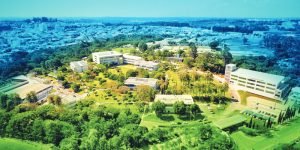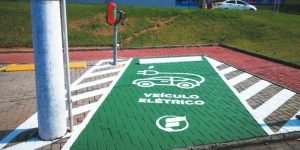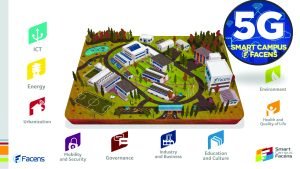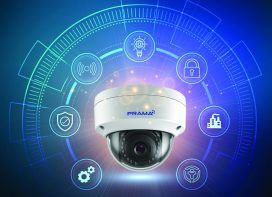Creating smart cities is high on the agenda of almost every government and civic body. To keep up with the changes in technology, various forms of experimentation and learning are being explored throughout the world. We touch upon one such program at the Smart Campus Facens in Brazil.
Smart Campus Facens is a living lab program that aims to educate students on the implementation of smart city projects, allowing for real time experimentation of the designs within their campus. This unique structure allows for testing of smart city projects on a smaller scale before widespread execution.
There are various requirements for the actualisation of a smart city project. Highly skilled workers with expertise in Engineering, Architecture, Technology and Systems planning, are going to be needed to make this a reality. The whole concept of the Smart Campus Facens is to expedite this process and prepare for the inevitable job requirements that will arise.
The Head of Research and General Coordinator, Dr. Regiane Relva Romano tells us, “The project is the inspiration for many cities that are asking our help to create a better place for the citizens. We also helped our City (Sorocaba) to be a FabCity and now the entire community is working to change the city. Besides this, many cities are asking for our help to implement the smart cities concepts.”
This program focuses on prototypes, tests, analysis and replication of the solutions within a larger urban context. It is structured around nine blocks, which form the basis of any smart city.

ICT (Information and Communications Technologies – The aim is to integrate real-time data processing that automates technologies and systems within the smart city. It focuses on communication and data networks, optical fibre, wearable tech, Internet of Things (IoT), next generation cellular networks, big data and analytics. One example is the use of drones to identify breeding areas of disease spreading mosquitoes, thus allowing for smarter control for municipalities. Facens also has an integrated dashboard that measures and controls data from each connected point in the campus. Taking all factors into account, this allows for unified decision making.

Energy – Optimisation of energy use and resources is vital for any smart city project. The streamlining of traditional fuel sources, implementation of alternatives and professional training to manage the resources is covered in the program. It implements different forms of energy systems such as solar energy, smart lighting, air condition control, automation, wind energy, piezoelectric energy, bioenergy, among others. This allows for full scale placement or proof of concept demonstrations of the different energy sources available. A real time diagnosis allows for the monitoring of energy consumption in different parts of the city, which leads to better deployment of resources.
Mobility and Security – This block presents solutions for new modal options in a smart city, integrating advanced security features. Vehicle monitoring and violation monitoring seamlessly fit into the Intelligent Transport Systems that have become a mainstay of every smart city project. Real time information allows for visual decision making, by using traffic simulation, bicycle lanes, encouraging use of different transport modes, intelligent parking, pedestrian safety on campus, and traffic radar innovations. Implementation of sensors and smart security features present a way to analyse and diagnose potential problems.
Environment – With pollution and waste levels rising across the world, integrating environment friendly strategies is vital in any smart city across the word. This block focuses on water consumption and storage, sewage discharge, solid waste management, environmental education, programs to reduce carbon footprint, biodiversity conservation, and weather monitoring. Studies are undertaken to create bio-materials that can be incorporated into construction of structures. In addition, implementation of green roof systems and solar trees allow for smart use of land space.
Health and Quality – When we think of a smart city, you cannot discount the higher standard of living that is expected of the future. Optimal use of land space and the creation of structures based on planned communities allows for a higher quality of life. Research is conducted on creating areas specifically for culture, sports, health and social activities. Smart monitoring of health services, emergency services, and ambulance fleet management creates a setting for a better response to emergency demands.

Industry and Business – Any thriving city requires innovation in industry and business. Technology and automation have opened up avenues to increase efficiency in industry, retail, supple chain and business within all sectors. Using innovative processes, the program focusses on refining production processes, Industry 4.0, industrial automation, commercial automation, home automation, management of the supply chain, autonomous solutions, and intelligent products solutions.
Urbanisation – Smart city programs must focus on understanding innovative material solutions, low-cost processes, and sustainable construction. Adapting this technology for local requirements is vital in urban planning. Intelligent use of construction processes which allows for smart buildings and smart homes, is part of this block. City-wide studies are undertaken to understand the spread of different vocations, allowing for better urban planning. With the advent of future technologies, real-time data becomes vital. Automation of external lighting and real time monitoring of any downtime is being implemented on the Facens Campus. Along with this, waste monitoring and water purity monitoring is being implemented that feeds into the central data centre.
Education and Culture – A focus on the future requirements also needs a focus on future innovators. To create smart city inhabitants of the future, there is a need to develop education models that feed into the smart city project. Dissemination of theoretical knowledge, practical case studies, and immersion in sustainable city environments is undertaken. This is achieved through the use of emerging technologies, methodological learning, practical and experimental learning, prototyping laboratories, innovation experiments and self-learning kits.
Governance – Ideas require execution and this block integrates the strategic, tactical and operational aspects of a smart city project. Managing big data and the execution of programs requires coordination between various teams, people and departments. Structuring projects for external markets and interfacing with different technologies, requires a calculated approach. Thus, governance configurations are required to be taught. The Smart Campus Facens also has an MBA program that is meant for civic officials and mayors.
The Smart Campus Facens utilises technology from the parent company Splice Grupo, which is employed and adjusted for optimisation over a period of time. Monitored violations, vehicle monitoring, Traffic Management Systems, remote data, smart dash board remote lighting management, etc, have been executed on the campus to create a testing model. This provides real time information for actual utilisation in bigger cities with larger populations.
 TrafficInfraTech Magazine Linking People Places & Progress
TrafficInfraTech Magazine Linking People Places & Progress


